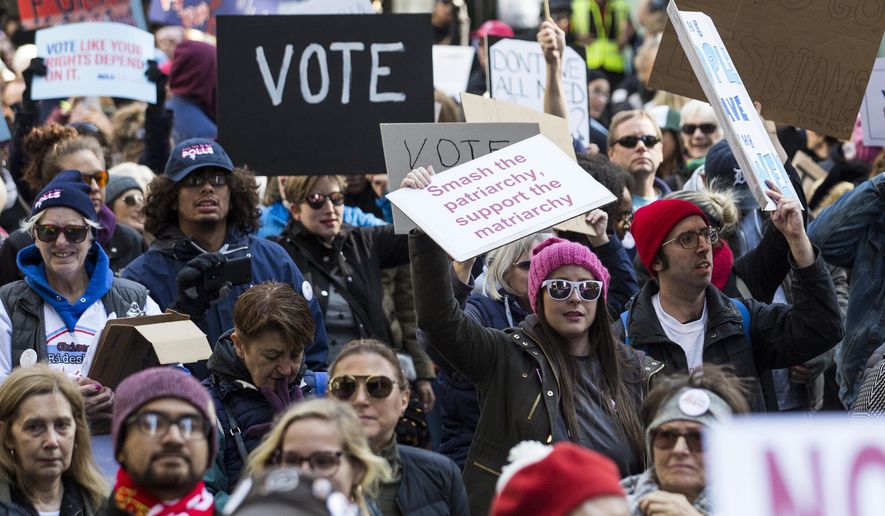Rarely do you see a divide between the National Organization for Women and Planned Parenthood, but the two feminist powerhouses have taken different approaches when it comes to the embattled Women’s March.
A week after Planned Parenthood said it would continue to partner with the Women’s March, NOW announced that it had cut off its financial support over “questions regarding leadership,” referring to Women’s March national co-chairs Bob Bland, Tamika Mallory, Carmen Perez and Linda Sarsour.
“NOW will continue to support the Women’s March Unity Principles, and we will participate and organize members to attend the March,” said NOW president Toni Van Pelt in a Dec. 21 statement. “However, we will withhold direct financial support until the current questions regarding leadership are resolved.”
NOW’s decision to distance itself from the Women’s March even as Planned Parenthood doubles down comes as another sign of the deepening feminist rift over the four march co-chairs amid allegations of anti-Semitism.
Thousands of women are expected to turn out for the third annual march on Jan. 19 in Washington, D.C., dubbed #WomensWave, but some sister-march groups have gone out of their way to disassociate themselves from the national organization as they move forward with plans for their own rallies.
In Louisiana, organizers said Saturday they decided to cancel the 2019 Women’s March on New Orleans over declining support, saying that participation, fundraising and sponsorships have dropped “drastically” in the wake of controversies surrounding the national co-chairs.
“Due to several issues we have decided it is necessary to cancel the 2019 Women’s March in New Orleans,” said a post on the National Organization for Women’s Baton Rouge chapter in a post.
The announcement by the NOW chapter, which organized the 2018 Women’s March on New Orleans, said that calls from local activists for the four national co-chairs to resign had gone unheeded.
“Many of the sister marches have asked the leaders of Women’s March, Inc. to resign but as of today, they have yet to do so,” said the NOW Baton Rouge statement. “The controversy is dampening efforts of sister marches to fundraise, enlist involvement, find sponsors and attendee numbers have drastically declined this year. New Orleans is no exception.”
Much of the controversy surrounds the leadership’s links to Nation of Islam Minister Louis Farrakhan, described by the Anti-Defamation League as “America’s leading anti-Semite.”
The uproar intensified after December reports in the Jewish magazine Tablet and the New York Times quoting early organizers who said Ms. Mallory and Ms. Perez blasted Jews for exploiting minorities, which the women have denied.
While the Women’s March has denounced anti-Semitism in multiple statements, critics fault the leadership with condemning Mr. Farrakhan’s pronouncements while stopping short of renouncing him personally.
The Women’s March Denver, which organized the 2017 and 2018 demonstrations, announced recently that it had changed its name to the Womxn’s March and emphasized that it was “not affiliated with the national Women’s March organization.”
“Womxn’s March Denver denounces anti-Semitism and the National Women’s March leadership team’s failure to clearly disassociate from anti-Semitic public figures,” said the group in a Nov. 14 statement. “We proudly support our Jewish sisters and brothers. We condemn all language and actions of hate directed at the Jewish community.”
Other feminists—including some of the original 2017 march organizers—have spun off alternative march organizations that explicitly reject anti-Semitism, such as March On, the Women’s March Alliance, and WoMen 4 All.
Despite the criticism, the Women’s March has hardly been abandoned on the left. The group announced Monday that Alicia Garza, co-founder of Black Lives Matter, had agreed to speak at the Oakland march.
Supporters have pointed to the organization’s work on progressive issues as well as its statements against anti-Semitism.
“We must also unequivocally reaffirm, as the Women’s March leadership has, that there is no place for anti-Semitism, homophobia, transphobia, or any kind of bigotry in our communities, our progressive movement, and our country,” said the Planned Parenthood statement on Refinery29.
The ice-cream company Ben & Jerry’s defended in October its decision to donate $25,000 to the Women’s March as part of the kick-off for its Pecan Resist flavor, calling the organization “critical to supporting, defending, and advancing social justice within our society.”
A Ben & Jerry’s spokeswoman told the Independent Review Journal that the firm was “comfortable” with partnering with the Women’s March.
“We’re comfortable with the idea that the people and the causes we partner with may have a point of view different from our own on some issues,” said the company. “They can be controversial, just as we can. Linda may not agree with everything we’ve done. But the work that she has done to promote women’s rights, as co-chair of the Women’s March, is undeniably important and we are proud to join her in that effort.”
Meanwhile, Women’s March leaders have blamed sexism and racism in part for the flood of criticism, saying they have been held to a higher standard than white women and men.
“Even other women who are at the helm of leadership in different organizations that are mainly white-led organizations are not held to the same standards that we’ve been held to,” said Ms. Mallory in a Dec. 12 Facebook Live.
Ms. Sarsour said that the group plans to launch a 30-member steering committee and revamp its Unity Principles, which make no mention of Jewish women or anti-Semitism, promising to “keep making the table bigger.”
She also urged supporters to focus on the big picture: defeating white supremacy.
“Amongst us we will have differences, we will fight amongst us, but we are family,” said Ms. Sarsour.
• Valerie Richardson can be reached at vrichardson@washingtontimes.com.




Please read our comment policy before commenting.